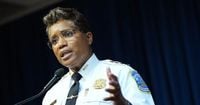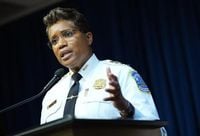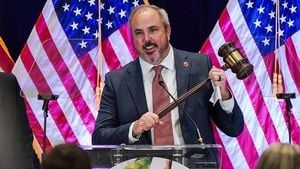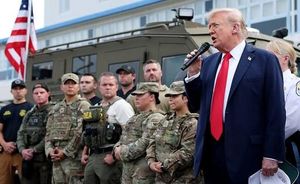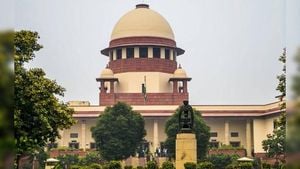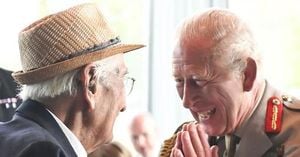Washington, D.C. found itself at the center of a dramatic showdown this week as the Trump administration attempted one of the most sweeping federal interventions in the city’s law enforcement since the advent of home rule in 1973. The move ignited a fierce legal and political battle, exposing deep rifts over local autonomy, immigration enforcement, and the balance of power between the federal government and the District’s elected officials.
The crisis began in earnest on August 14, 2025, when U.S. Attorney General Pam Bondi issued a startling order: Drug Enforcement Administration (DEA) Administrator Terrance Cole would become the Metropolitan Police Department’s (MPD) “emergency police commissioner.” According to AP, this directive required MPD officials to obtain Cole’s approval before issuing any further directives, effectively placing the city’s police force under federal control.
DC Police Chief Pamela Smith, a veteran of nearly three decades in law enforcement, wasted no time in firing back. In a strongly worded statement filed with the court the following day, Smith condemned the Bondi order, warning it would “upend the command structure of MPD, endangering the safety of the public and law enforcement officers alike.” She argued that requiring all police directives to pass through Cole would “wreak operational havoc within MPD and create tremendous risk for the public.” Smith emphasized that the sudden imposition of a new, unfamiliar command structure would “freeze public safety operations,” sowing confusion among thousands of officers and jeopardizing both officer and civilian safety.
“In my nearly three decades in law enforcement, I have never seen a single government action that would cause a greater threat to law and order than this dangerous directive,” Smith declared, according to Washington Post. She further noted that Cole, along with hundreds of federal agents and National Guard members newly deployed to the city, were “unfamiliar with MPD procedures and the communities in which we police.”
The Bondi order came amid a broader surge of federal law enforcement and National Guard troops into Washington, D.C. As AP reported, more than 1,750 federal personnel were involved in operations across the city, making 33 arrests in a single night, including 15 migrants without permanent legal status and others wanted for serious crimes. Humvees appeared outside Union Station, and National Guard troops watched over landmarks, creating a tense and unfamiliar atmosphere for residents.
Mayor Muriel Bowser responded with a message to D.C. citizens, calling the week “unsettling and unprecedented.” She wrote, “Over the course of a week, the surge in federal law enforcement across D.C. has created waves of anxiety.” Bowser also highlighted the existential challenge to the city’s limited self-government, saying, “Our limited self-government has never faced the type of test we are facing right now.” She urged Washingtonians to “show the entire nation what it looks like to fight for American democracy – even when we don’t have full access to it.”
The legal battle quickly moved to federal court, where U.S. District Judge Ana Reyes pressed both sides to seek compromise. Reyes, nominated by President Joe Biden, expressed skepticism about the legality of the administration’s attempted takeover. “The way I read the statute, the president can ask, the mayor must provide, but the president can’t control,” she said, according to AP. Her comments suggested that while the president holds significant power over the District, that power is not without limits.
Facing mounting legal and political pressure, the Trump administration partially reversed course on August 15, agreeing to leave Chief Smith in charge of the police department. However, Attorney General Bondi issued a new directive the same day, ordering the MPD to cooperate with federal immigration enforcement “regardless of any city law.” This move, as reported by AP, signaled a retreat from the full federal takeover but kept pressure on D.C. leaders to assist in President Trump’s mass-deportation campaign, even as the city’s “sanctuary” policies restrict such cooperation.
Bondi continued to criticize D.C. Attorney General Brian Schwalb for opposing federal efforts, posting on social media that he “continues to oppose our efforts to improve public safety.” Yet she also stated a commitment to working with Mayor Bowser. Meanwhile, Bowser’s office indicated it was still evaluating how to comply with the new federal order, reaffirming that the city would continue to uphold its sanctuary city laws.
The dispute over immigration enforcement became a flashpoint. Bondi’s earlier directive to install Cole as police commissioner came after Chief Smith had instructed MPD officers to share information with immigration agencies only in limited circumstances. The Justice Department objected, arguing that such instructions perpetuated “sanctuary policies.” According to AP, the administration’s determination to override these local policies was a key driver of the attempted takeover.
Immigrant advocates in Washington, D.C. reported a dramatic shift in federal enforcement activity since the previous Friday. Amy Fischer, an organizer with Migrant Solidarity Mutual Aid, said that while Immigration and Customs Enforcement (ICE) had previously targeted specific individuals, the city was now seeing “roving patrols” and a significant uptick in ICE activity. “A hotline set up by immigration advocates to report ICE activity is receiving calls almost off the hook,” Fischer told AP. ICE confirmed that “several” people had been arrested in Washington on Friday, and social media videos showed uniformed personnel detaining individuals on city streets.
The turmoil also spilled out onto the streets. More than 100 protesters gathered in front of police headquarters, chanting “Protect home rule!” and waving signs reading “Resist!” Volunteers scrambled to help homeless residents relocate as federal law enforcement teams fanned out across the city.
For many Washingtonians, the week’s events underscored the city’s unique vulnerability. While the Home Rule Act of 1973 granted D.C. the right to elect its own mayor and city council, the president retains special powers over the capital—powers that have rarely been wielded so forcefully. Trump’s attempted police takeover marked the first such intervention since the law’s passage. By statute, any direct federal control over the police is limited to 30 days without congressional approval, though the president has suggested he might seek an extension.
Despite the administration’s claims of a public safety crisis, AP noted that while D.C. has faced spikes in violence and visible homelessness, its homicide rate remains lower than several other major U.S. cities. Many local leaders and residents viewed the federal intervention as an overreach, motivated more by politics and immigration policy than by urgent public safety needs.
As the dust settles, the episode leaves lingering questions about the future of D.C.’s self-government, the boundaries of federal power, and the city’s role as both a symbol and a battleground for American democracy. The events of this week will likely echo in the District—and beyond—for months to come.
